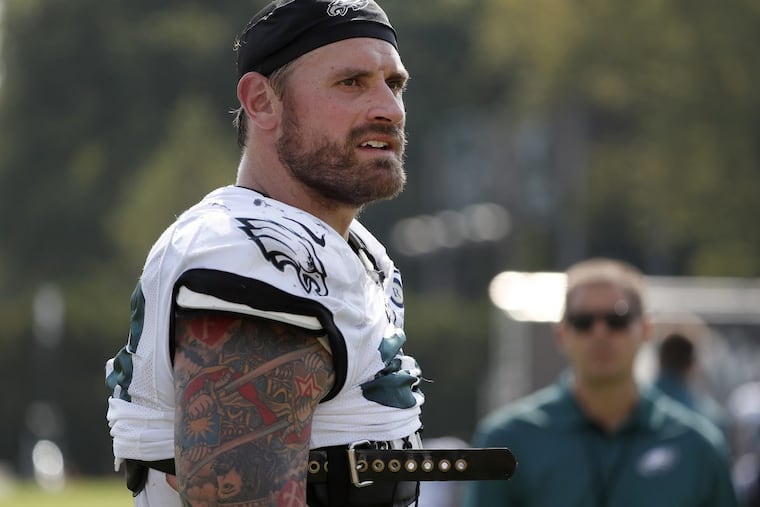Eagles' Chris Long defends hometown Charlottesville, blasts Trump | Marcus Hayes
Long witnessed the weekend's violent racist protests in his hometown and President Trump's inadequate responses with equal disgust.

Chris Long, defensive end, is mad.
He thinks his president should be, too.
Chris Long, passionate American, is embarrassed.
He thinks his president should be, too.
Over the weekend, white supremacists descended on Charlottesville, Va., Long's hometown, and briefly made it the global epicenter for racism. Events climaxed when a neo-Nazi terrorist allegedly rammed his car into a crowd of counter-protesters, killing one and injuring 19 others. He has been charged with second-degree murder, among other crimes.
"When you think about the right way to digest it, it's hard to do anything but get angry. I don't know if that's what these people are trying to incite, but it's working. It pisses you off," Long said after practice Sunday morning, still reeling from the faces and voices of hate.
Sweat dripped from his full beard. Anger radiated off his 6-foot-3, 270-pound frame. Notably, Long is white — with rage.
"You know that subculture exists in our country, and it has in our country for a long time, but when they all get together in one place — especially your hometown — it really bothers you," he said.
Long, who is politically outspoken on Twitter, tweeted several times over the weekend, outraged by the protesters and enraged with the responses of politicians. The obtuseness of a certain politician particularly appalled Long.
"You can say what you want about the president's remarks," Long said. "I wish he'd categorically spoken out against white supremacy."
President Trump has offered no direct condemnation of the bigots. As such, this weekend the "alt-right" adopted him as the complicit leader of its cause.
To Long's dismay, it also adopted Charlottesville as its ideological anchor city.
The white supremacists targeted Charlottesville to protest its plans to rename parks and to move statues that celebrate Confederate generals Robert E. Lee and Stonewall Jackson. The racists held an eerie, tiki-torch-light demonstration Friday night. On Saturday, supported by militias armed with assault rifles, the groups threw up Nazi salutes and chanted, "Heil Trump!" As passions mounted Saturday, police say James A. Fields, 20, from Maumee, Ohio, accelerated his Dodge Challenger into a group of counter-protesters and killed Charlottesville paralegal Heather Heyer.
The Tweeter-in-Chief was silent Friday night. As the scene grew ugly Saturday, he finally blamed "many sides" for clashes. Pressure following the killing on Saturday elicited a brief, bizarre statement that painted counter-protesters as being as violent, as hateful and, absurdly, as bigoted as the cretins who infested their city — an evil false equivalence.
"Dangerous," Long said.
Correct.
Long doesn't need this attention. He is smart and rich and famous. He has lived a charmed life. He is a Super Bowl champion who played for his hometown college team, the University of Virginia. His Pro Football Hall of Fame father, Howie, moved the family from Los Angeles to Charlottesville when Chris was 8. He is 32 now.
So was Heather Heyer.
His fury is real.
Long maintains a residence in Charlottesville but said no one close to him was affected by the weekend's violence, though his town took quite a beating.
"People are asking me, 'Why Charlottesville?' " Long said. "Look, Charlottesville is taking the right steps to accommodate the sensitivities of people who might feel offended by statues and parks named after Confederate generals. I think that is very reasonable. I don't know what it's like to walk past a statue like that, as a minority. We're doing the right thing."
White supremacists don't think it's the right thing, but, of course, Long isn't interested in accommodating their sensitivities.
"Those people are feeling threatened and feeling insecure," Long said. "That's why they're coming to rally."
Long is convinced that the white supremacists are visitors; that this is not a local problem; that Charlottesville should not be seen as a 21st-century Birmingham. He also believes that there should be no need for Trump's base to have a home base.
"No matter where these people are coming from, this subculture shouldn't exist in America," Long said. "Anyway, I'm fairly confident the vast, vast majority of those people are not from Charlottesville. If you know Charlottesville, you know it's a progressive, forward-thinking, reasonable place. And this is just so far off the reservation …"
Is it? The parks and statues in question were dedicated decades after the Civil War ended. They have been around for almost 100 years. They just survived two terms by a black president. Has the reservation really changed so drastically? And, if it has changed, why just move the statues; why not destroy them?
Because, Long admitted, not everyone in Charlottesville really wants to forget. His compromise:
"If you say 'It's history and shouldn't be destroyed,' then put it in a museum where they can educate people about how far we've come, and the dangers of white supremacy and the Confederacy. Don't put it in a public place, where people who might be offended by it have to walk by it every day."
That's an elegant solution. It sounds even cleverer coming from a professional athlete; as a group, jocks tend to shrink from controversy to protect their "brand."
Long would rather protect his city and his fellow citizens.
"If you listen to people who tell you to 'Stick to sports,' I would ask them, 'Do you stick to whatever your occupation is?' " Long said. "People always want to hear from athletes when they agree with them. When we voice a [dissenting] opinion, they have an issue with it. I think that athletes are role models. We should think about what we're saying, then speak. And speak wisely."
That's excellent advice for athletes, and for presidents.